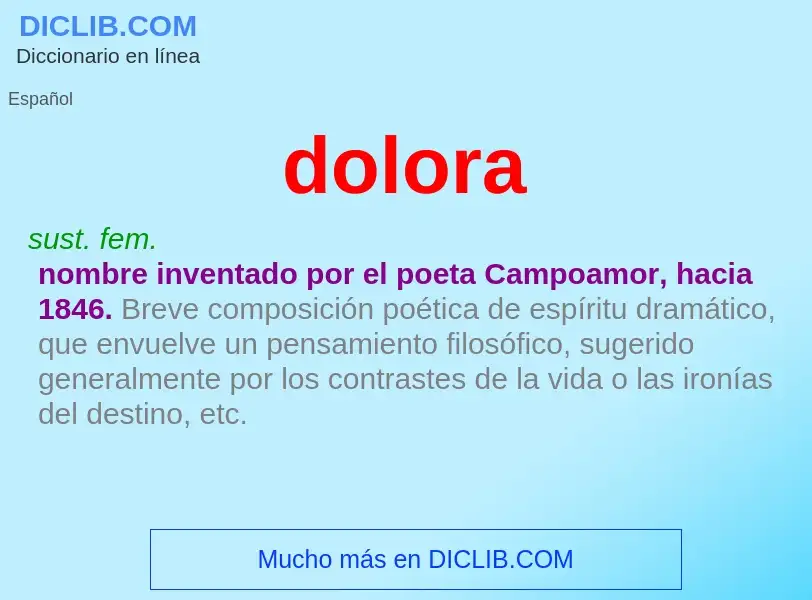Enter a word or phrase in any language 👆
Language:
Translation and analysis of words by ChatGPT artificial intelligence
On this page you can get a detailed analysis of a word or phrase, produced by the best artificial intelligence technology to date:
- how the word is used
- frequency of use
- it is used more often in oral or written speech
- word translation options
- usage examples (several phrases with translation)
- etymology
What (who) is DOLORA - definition
dolora
sust. fem.
nombre inventado por el poeta Campoamor, hacia 1846. Breve composición poética de espíritu dramático, que envuelve un pensamiento filosófico, sugerido generalmente por los contrastes de la vida o las ironías del destino, etc.
dolora
dolora (de "dolor") f. Liter. Nombre aplicado por Campoamor a ciertas composiciones suyas breves que encierran un pensamiento de filosofía de la vida. *Poesía.
DOLORA
(Der. de dolor.)
Composición poética breve creada por el poeta asturiano Ramón de Campoamor (1817-1901). Es una sentencia escrita en verso que comprende un pensamiento filosófico escéptico con la intención de transmitir una enseñanza moral. Suelen narrar pequeños dramas de la vida cotidiana con un tono humorístico y sentimental.
Sobre la tumba de ella escribió un día:
"¡ Por darte la vida a ti, me mataría!"
Y al otro día, por autor incierto,
con lápiz al final, se vio añadido:
"Si ella hubiese vivido,
ya de hastío tal vez la hubieras muerto."
El anónimo, de RAMÓN DE CAMPOAMOR.
Composición poética breve creada por el poeta asturiano Ramón de Campoamor (1817-1901). Es una sentencia escrita en verso que comprende un pensamiento filosófico escéptico con la intención de transmitir una enseñanza moral. Suelen narrar pequeños dramas de la vida cotidiana con un tono humorístico y sentimental.
Sobre la tumba de ella escribió un día:
"¡ Por darte la vida a ti, me mataría!"
Y al otro día, por autor incierto,
con lápiz al final, se vio añadido:
"Si ella hubiese vivido,
ya de hastío tal vez la hubieras muerto."
El anónimo, de RAMÓN DE CAMPOAMOR.
Examples of use of DOLORA
1. Dolora Zajick se mostró poderosa como Éboli, aunque también vulgar.

